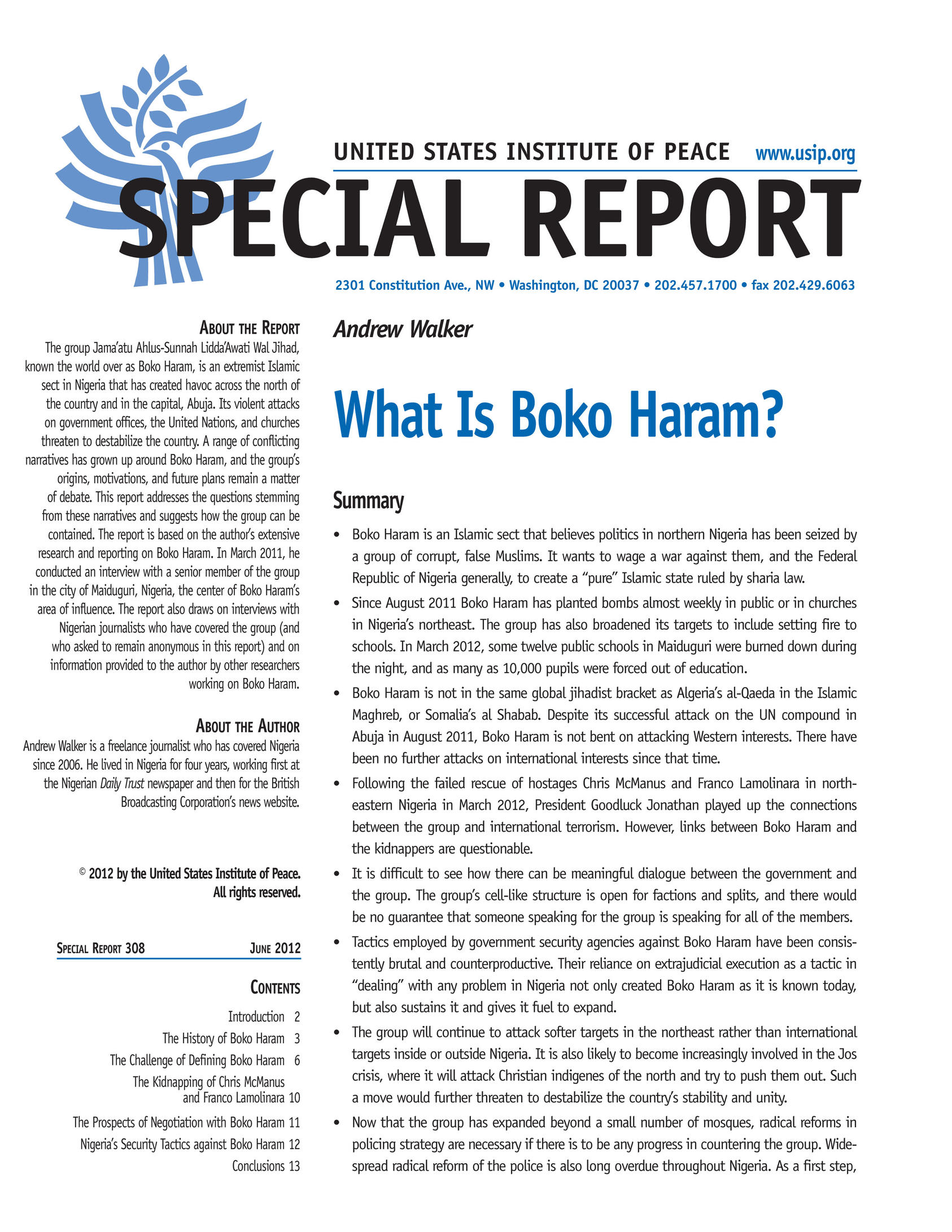The group Jama’atu Ahlus-Sunnah Lidda’Awati Wal Jihad, known the world over as Boko Haram, is an extremist Islamic sect in Nigeria that has created havoc across the north of the country and in the capital, Abuja. Its violent attacks on government offices, the United Nations, and churches threaten to destabilize the country. A range of conflicting narratives has grown up around Boko Haram, and the group’s origins, motivations, and future plans remain a matter of debate. This report addresses the questions stemming from these narratives and suggests how the group can be contained.

Summary
- Boko Haram is an Islamic sect that believes politics in northern Nigeria has been seized by a group of corrupt, false Muslims. It wants to wage a war against them, and the Federal Republic of Nigeria generally, to create a “pure” Islamic state ruled by sharia law.
- Since August 2011 Boko Haram has planted bombs almost weekly in public or in churches in Nigeria's northeast. The group has also broadened its targets to include setting fire to schools. In March 2012, some twelve public schools in Maiduguri were burned down during the night, and as many as 10,000 pupils were forced out of education.
- Boko Haram is not in the same global jihadist bracket as Algeria's al-Qaeda in the Islamic Maghreb, or Somalia's al Shabab. Despite its successful attack on the UN compound in Abuja in August 2011, Boko Haram is not bent on attacking Western interests. There have been no further attacks on international interests since that time.
- Following the failed rescue of hostages Chris McManus and Franco Lamolinara in northeastern Nigeria in March 2012, President Goodluck Jonathan played up the connections between the group and international terrorism. However, links between Boko Haram and the kidnappers are questionable.
- It is difficult to see how there can be meaningful dialogue between the government and the group. The group's cell-like structure is open for factions and splits, and there would be no guarantee that someone speaking for the group is speaking for all of the members.
- Tactics employed by government security agencies against Boko Haram have been consistently brutal and counterproductive. Their reliance on extrajudicial execution as a tactic in “dealing” with any problem in Nigeria not only created Boko Haram as it is known today, but also sustains it and gives it fuel to expand.
- The group will continue to attack softer targets in the northeast rather than international targets inside or outside Nigeria. It is also likely to become increasingly involved in the Jos crisis, where it will attack Christian indigenes of the north and try to push them out. Such a move would further threaten to destabilize the country's stability and unity.
- Now that the group has expanded beyond a small number of mosques, radical reforms in policing strategy are necessary if there is to be any progress in countering the group. Widespread radical reform of the police is also long overdue throughout Nigeria. As a first step, jailing a number of police officers responsible for ordering human rights abuses might go some way to removing a key objection of the group.
About the Report
The group Jama'atu Ahlus-Sunnah Lidda'Awati Wal Jihad, known the world over as Boko Haram, is an extremist Islamic sect in Nigeria that has created havoc across the north of the country and in the capital, Abuja. Its violent attacks on government offices, the United Nations, and churches threaten to destabilize the country. A range of conflicting narratives has grown up around Boko Haram, and the group's origins, motivations, and future plans remain a matter of debate. This report addresses the questions stemming from these narratives and suggests how the group can be contained. The report is based on the author's extensive research and reporting on Boko Haram. In March 2011, he conducted an interview with a senior member of the group in the city of Maiduguri, Nigeria, the center of Boko Haram's area of influence. The report also draws on interviews with Nigerian journalists who have covered the group (and who asked to remain anonymous in this report) and on information provided to the author by other researchers working on Boko Haram.
About the Author
Andrew Walker is a freelance journalist who has covered Nigeria since 2006. He lived in Nigeria for four years, working first at the Nigerian Daily Trust newspaper and then for the British Broadcasting Corporation's news website.